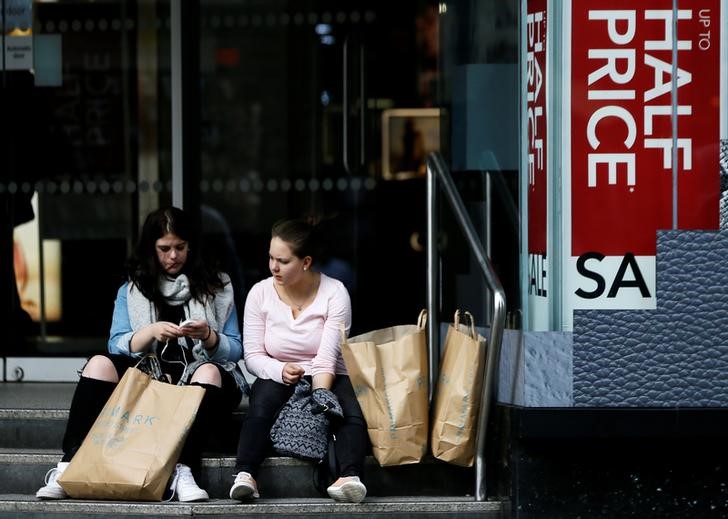By Andy Bruce
LONDON (Reuters) - British shoppers cut back their spending last month at the fastest pace for any October since 2008, a reminder of the strain on household budgets even before the Bank of England raised interest rates, a survey showed on Tuesday.
Retail sales declined by an annual 1.0 percent on a like-for-like basis, which strips out changes in store size, the British Retail Consortium (BRC) said. Sales rose 1.9 percent in September.
Payments company Barclaycard (L:BARC) also reported weak consumer spending, with a split between spending on essentials and spending on discretionary items.
Last Thursday, the Bank of England raised interest rates for the first time in more than 10 years, despite a slowdown in economic growth this year.
Most economists polled by Reuters before the decision thought raising rates would be a mistake, partly because of fragile consumer finances, which have been under pressure from weak wage growth and the rise in inflation since last year's Brexit vote.
Governor Mark Carney has said the worst of the squeeze on households is ending and the impact of the rate increase will not be big for households, whose spending is the main driver of Britain's economy.
But analysts were less sure in light of Tuesday's figures, as well as a similar Confederation of British Industry survey published last month, which showed sales plunged during October at the fastest rate since 2009.
"The UK BRC Retail Sales make for rather depressing reading ... thus raising further questions about the wisdom of last week's BoE rate hike, let alone the prospect of any follow-up," said Marc Ostwald, market strategist at ADM Investor Services.
The BRC said its figures were a cause for concern ahead of the Christmas holidays. "The decline was driven by the worst performance of non-food sales since our record began in January 2011," said Helen Dickinson, BRC's chief executive.
"The growth in food sales, meanwhile, adds some colour to this otherwise anaemic picture, but these figures are very much buoyed by inflation."
Consumer price inflation reached 3 percent in September, its highest level in more than five years and above the BoE's 2 percent target. The central bank expects the consumer price index to peak at 3.2 percent in October.
The BRC, whose figures are not seasonally adjusted, said total sales last month edged up 0.2 percent, which was also the weakest increase for any October since 2008.
Dickinson said the last week's rate hike - the first in more than a decade - would add more pressure on household budgets.
The impact from the rise in borrowing costs on the housing market looks much less marked, mortgage lender Halifax said as it reported a pick-up in house prices in the three months to October.
Barclaycard's measure of consumer spending growth eased to 2.4 percent year-on-year, compared with an increase of 3 percent in September.

"In light of the Bank of England's announcement last week, it'll be interesting to see how shoppers, who have so far demonstrated their resilience, continue to juggle the many demands on their budget," said Paul Lockstone, managing director at Barclaycard.